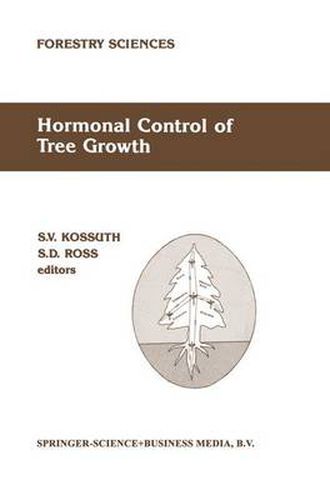Readings Newsletter
Become a Readings Member to make your shopping experience even easier.
Sign in or sign up for free!
You’re not far away from qualifying for FREE standard shipping within Australia
You’ve qualified for FREE standard shipping within Australia
The cart is loading…






This title is printed to order. This book may have been self-published. If so, we cannot guarantee the quality of the content. In the main most books will have gone through the editing process however some may not. We therefore suggest that you be aware of this before ordering this book. If in doubt check either the author or publisher’s details as we are unable to accept any returns unless they are faulty. Please contact us if you have any questions.
This is the third annual compendium of a Technical Session of the Physiology Working Group of the Society of American Foresters held at the National Convention. Specialists in a dedicated area of tree physiology were invited to prepare chapter contributions synthesizing the status of knowledge in their area of expertise. Plant growth regulators (PGRs) was selected as the topic for in-depth examination at the 1986 Technical Session because a knowledge of how these secondary messengers regulate tree morphogenesis is vital to applications of biocontrol and biotechnology. Plant growth regulators have been the subject of numerous reviews in recent years. However, few have dealt specifically with woody perennials, and they are generally confined to single processes and/or organs. This volume attempts to provide a more comprehensive treatise of PGRs as they influence various ontogenetic events in forest trees. Reproductive physiology, both sexual and asexual, is emphasized because of its relevance to current efforts directed at increasing efficiency in the breeding and production of genetically improved trees for reforestation. The chapters on vegetative growth will be of interest to silviculturists and urban foresters as they consider cultural treatments in the management of forests and individual trees for specific products and purposes. This book should serve as a valuable text and source of reference for students, researchers and other professionals interested in gaining a better understanding of PGRs. The reader, however, who expects definitive answers to how PGRs function or can be used to control specific processes is likely to be disappointed.
$9.00 standard shipping within Australia
FREE standard shipping within Australia for orders over $100.00
Express & International shipping calculated at checkout
This title is printed to order. This book may have been self-published. If so, we cannot guarantee the quality of the content. In the main most books will have gone through the editing process however some may not. We therefore suggest that you be aware of this before ordering this book. If in doubt check either the author or publisher’s details as we are unable to accept any returns unless they are faulty. Please contact us if you have any questions.
This is the third annual compendium of a Technical Session of the Physiology Working Group of the Society of American Foresters held at the National Convention. Specialists in a dedicated area of tree physiology were invited to prepare chapter contributions synthesizing the status of knowledge in their area of expertise. Plant growth regulators (PGRs) was selected as the topic for in-depth examination at the 1986 Technical Session because a knowledge of how these secondary messengers regulate tree morphogenesis is vital to applications of biocontrol and biotechnology. Plant growth regulators have been the subject of numerous reviews in recent years. However, few have dealt specifically with woody perennials, and they are generally confined to single processes and/or organs. This volume attempts to provide a more comprehensive treatise of PGRs as they influence various ontogenetic events in forest trees. Reproductive physiology, both sexual and asexual, is emphasized because of its relevance to current efforts directed at increasing efficiency in the breeding and production of genetically improved trees for reforestation. The chapters on vegetative growth will be of interest to silviculturists and urban foresters as they consider cultural treatments in the management of forests and individual trees for specific products and purposes. This book should serve as a valuable text and source of reference for students, researchers and other professionals interested in gaining a better understanding of PGRs. The reader, however, who expects definitive answers to how PGRs function or can be used to control specific processes is likely to be disappointed.